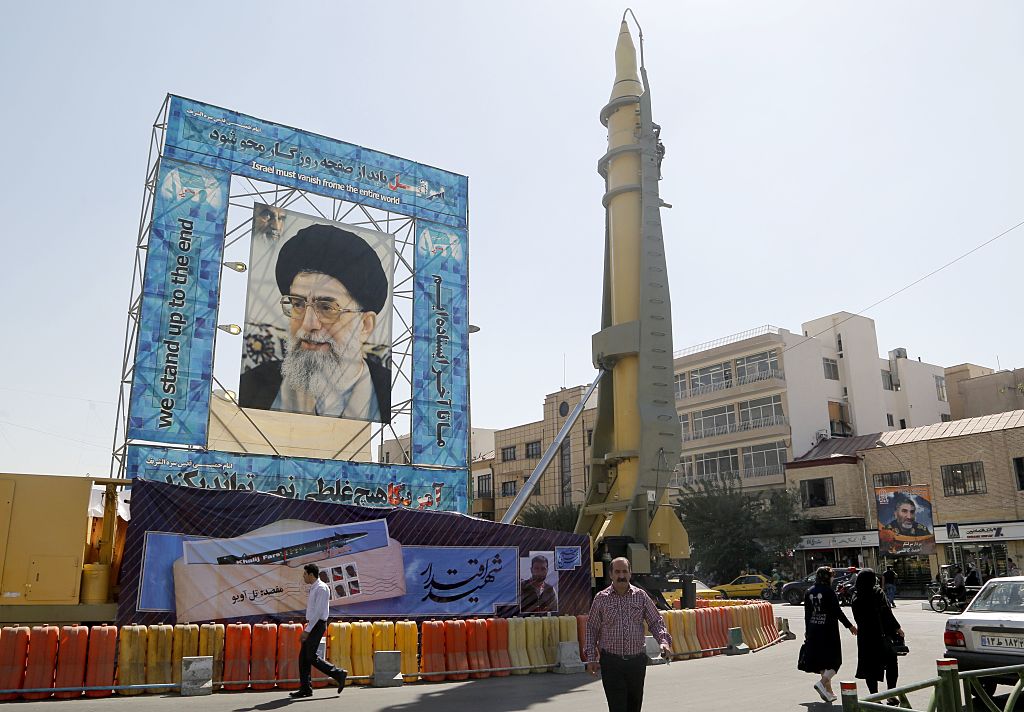Iran and North Korea reacted very differently to U.S. offers to help battle coronavirus


A free daily email with the biggest news stories of the day – and the best features from TheWeek.com
You are now subscribed
Your newsletter sign-up was successful
The United States has extended overtures toward two countries, Iran and North Korea, with whom tensions remain high, offering to cooperate in the battle against the coronavirus pandemic. Pyongyang and Tehran had very different responses.
Iran's Supreme Leader Ayatollah Ali Khamenei on Sunday refused the United States' assistance to fight the novel coronavirus pandemic, which has been particularly harsh in Iran where tough economic sanctions preventing the sale of crude oil and access to international financial markets remain in place.
In his speech, Khamenei not only rejected U.S. aid, but he also trumpeted a conspiracy theory first touted in China that the virus was a man-made U.S. government weapon. He said he doesn't know if the accusation is true, but wondered "who in their right mind would trust you to bring them medication" when that medication might be "a way to spread the virus more," before suggesting that the real reason U.S. medical personnel might want to come to Iran is to "see the effect of the poison they have produced."
The Week
Escape your echo chamber. Get the facts behind the news, plus analysis from multiple perspectives.

Sign up for The Week's Free Newsletters
From our morning news briefing to a weekly Good News Newsletter, get the best of The Week delivered directly to your inbox.
From our morning news briefing to a weekly Good News Newsletter, get the best of The Week delivered directly to your inbox.
Meanwhile, North Korea seemed to appreciate the gesture a little more. Pyongyang said Sunday that President Trump sent another personal letter to North Korean leader Kim Jong Un, this time reportedly expressing his willingness to cooperate with the country on "anti-epidemic" work, referring to the novel coronavirus outbreak.
Kim Yo Jong, Kim's sister and policy aid, praised the letter as "good judgment and proper action" and said Trump was impressed with North Korea's ability to curb the threat of the virus. North Korea has not reported any COVID-19 cases, but health experts fear the secretive nation is covering up an outbreak. The White House confirmed Trump sent Kim a letter, but did not comment on its contents. Read more at The New York Times and The Associated Press.
A free daily email with the biggest news stories of the day – and the best features from TheWeek.com
Tim is a staff writer at The Week and has contributed to Bedford and Bowery and The New York Transatlantic. He is a graduate of Occidental College and NYU's journalism school. Tim enjoys writing about baseball, Europe, and extinct megafauna. He lives in New York City.
-
 Crisis in Cuba: a ‘golden opportunity’ for Washington?
Crisis in Cuba: a ‘golden opportunity’ for Washington?Talking Point The Trump administration is applying the pressure, and with Latin America swinging to the right, Havana is becoming more ‘politically isolated’
-
 5 thoroughly redacted cartoons about Pam Bondi protecting predators
5 thoroughly redacted cartoons about Pam Bondi protecting predatorsCartoons Artists take on the real victim, types of protection, and more
-
 Palestine Action and the trouble with defining terrorism
Palestine Action and the trouble with defining terrorismIn the Spotlight The issues with proscribing the group ‘became apparent as soon as the police began putting it into practice’
-
 A Nipah virus outbreak in India has brought back Covid-era surveillance
A Nipah virus outbreak in India has brought back Covid-era surveillanceUnder the radar The disease can spread through animals and humans
-
 Trump HHS slashes advised child vaccinations
Trump HHS slashes advised child vaccinationsSpeed Read In a widely condemned move, the CDC will now recommend that children get vaccinated against 11 communicable diseases, not 17
-
 Covid-19 mRNA vaccines could help fight cancer
Covid-19 mRNA vaccines could help fight cancerUnder the radar They boost the immune system
-
 FDA OKs generic abortion pill, riling the right
FDA OKs generic abortion pill, riling the rightSpeed Read The drug in question is a generic version of mifepristone, used to carry out two-thirds of US abortions
-
 The new Stratus Covid strain – and why it’s on the rise
The new Stratus Covid strain – and why it’s on the riseThe Explainer ‘No evidence’ new variant is more dangerous or that vaccines won’t work against it, say UK health experts
-
 RFK Jr. vaccine panel advises restricting MMRV shot
RFK Jr. vaccine panel advises restricting MMRV shotSpeed Read The committee voted to restrict access to a childhood vaccine against chickenpox
-
 Texas declares end to measles outbreak
Texas declares end to measles outbreakSpeed Read The vaccine-preventable disease is still spreading in neighboring states, Mexico and Canada
-
 RFK Jr. shuts down mRNA vaccine funding at agency
RFK Jr. shuts down mRNA vaccine funding at agencySpeed Read The decision canceled or modified 22 projects, primarily for work on vaccines and therapeutics for respiratory viruses
